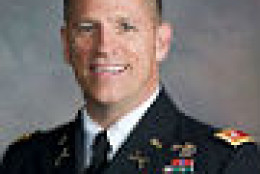Defense
-
Closing an operating base in Afghanistan isn't as simple as packing up and moving out. The Army is taking care to leave the land as it was before soldiers found it. Army Lt. Col. Jason Borg works as a base engineer at the International Security Assistance Force joint command. He spoke via satellite from Afghanistan with Tom Temin on the Federal Drive about the logistical ballet.
August 12, 2014 -
Big data success at the Army's Enterprise Management Decisions Support earns that team an honor. Lt. Col. Bobby Saxon receives the 2014 GOVTek GTRA Executive Technology Award for Excellence in Big Data. Saxon is system program manager for the EMDS. On In Depth with Francis Rose, he explained how big data will impact decision making in the military.
August 11, 2014 -
Navy jets have been dropping 500 lb. bombs in Iraq on ISIL positions in northern Iraq. The 500 lb. bomb is one of the smallest and one of the most common air-dropped weapons in the world. Although the nominal weight is 500 lbs., its actual weight varies considerably depending on its configuration, from 510 lbs. to 570 lbs. It comes with a streamlined steel casing containing 192 lbs. of Tritonal high explosive. The bombs being used in Iraq are laser-guided for precision.
August 11, 2014 -
Move over MRE's, the Army is developing 3D food printers for soldiers in the field. If successful, soldiers will instantly have access to their food of choice by pressing the print button. The new technology could save money, avoid wasted food and give soldiers more food choices. Lauren Oleksyk is the food leader at the Army's Natick Research, Development and Engineering Center. She joined Tom Temin and Emily Kopp on the Federal Drive to discuss the new project.
August 08, 2014 -
As the body of an American General arrives back in the U.S. after being killed in Afghanistan. Afghan officials say that the soldier who killed General Harold Green came from a part of Afghanistan with a long history of Haqqani network fighters living there. The Haqqani network has strong links to the Taliban and has carried out significant attacks against U.S. forces.
August 07, 2014 -
The reality of losing an American general in Afghanistan is setting in. "Even our generals are out there, many of whom have served many tours of duty both in Afghanistan and Iraq, leading America's sons and daughters, and that's something we should all think about from time to time," says RET. Army LT. General Harold Swan. Army MAJ. Harold Greene was killed in an insider attack yesterday in Kabul City, Afghanistan.
August 06, 2014 -
A steady flow of policy documents details how the branches of the military -- and the Defense Department as a whole -- will prepare for the wars of the future. But the changing nature of warfare may have the United States preparing for the wrong war. Retired Army Lt. Gen. David Barno is senior fellow and co-director of the Responsible Defense Program at the Center for a New American Security. He was the first Commander of Military Operations-Afghanistan. He writes on War On The Rocks, under the title "The Shadow Wars of the 21st Century," that war is morphing. He explained how on In Depth with Francis Rose.
August 01, 2014 -
The Army says the alternative and renewable energy industry should not look to the military as a giant source of investment capital for new technologies. But there are a few exceptions to that rule.
August 01, 2014 -
Each week, Federal News Radio’s Ciera Crawford highlights federal employees and government contractors charged with defrauding the government. Have a tip or want to contact Ciera? You can do so by email or phone, 202-274-4824.
July 31, 2014 -
Service's latest strategy document sees a future in which it will need to be more flexible and adaptable, including in its acquisition and personnel policies and organizational structures.
July 31, 2014 -
Improving acquisition compliance and ethics may involve less rulemaking and more culture shaping according to panelists at the National Contract Management Association's World Congress conference. At the conference, agency leaders discussed the need to streamline and pursue innovative approaches to federal acquisition policies.
July 30, 2014 -
Air Force leadership rolls out a new strategic plan today. "America's Air Force: A Call to the Future" is a 30-year plan that focuses on four key points the Air Force believes will shape the future of air power. But their plan isn't entirely a new concept. Russell Rumbaugh is Director of Budgeting for Foreign Affairs and Defense, and Senior Associate, at the Stimson Center. Russell and his colleague Barry Blechman from Stimson wrote in Breaking Defense about a concept called Strategic Agility. On In Depth with Francis Rose, he explained the connection between today's plan -- as introduced by Secretary James and General Welsh -- and the work he and Barry have done.
July 30, 2014 -
The Army plans to say goodbye to more than 130,000 soldiers this year. To help troops move on with their lives the service is partnering with private employers who can provide job training. A new program will train some to enter the automotive industry. One of the partners is Raytheon. Lynn Dugle is president of Raytheon Intelligence, Information and Services. She joined Tom Temin and Emily Kopp on the Federal Drive to discuss the new program.
July 29, 2014 -
An uninvited guest crashes the world's largest international naval exercise. A Chinese spy ship is watching over the Rim of the Pacific exercise that runs until Friday. But the ship isn't breaking any navigation laws, so Chinese military experts say it's a non-issue. Sam LaGrone, news editor of the US Naval Institute, broke the news of the ship's presence outside RIMPAC. On In Depth with Francis Rose, he explains why it's not a huge surprise.
July 29, 2014 -
The Pentagon's main IT provider shuttered its large data center in Huntsville, Alabama. in May, leaving only 10 of its large Defense Enterprise Computing Centers in its inventory. The mission of those remaining DECCs, however, is growing, not shrinking.
July 25, 2014










